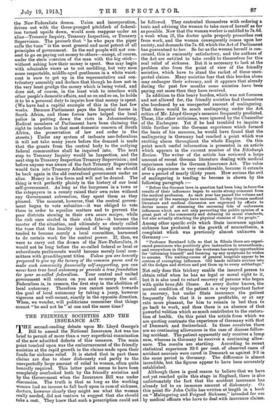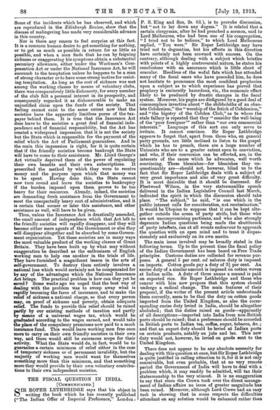THE FRIENDLY SOCIETIES AND THE INSURANCE ACT. be followed. They
contented themselves with ordering a tonic and advising the woman to take care of herself as far as possible. Now that the woman worker is entitled to 75.6d. a week when ill, the doctor quite properly prescribes rest from work, and the woman consequently comes upon her society, and demands the 7s. 6d. which the Act of Parliament has guaranteed to her. So far as the woman herself is con- cerned, this is eminently satisfactory, and the authors of the Act are entitled to take credit to themselves for this real relief of sickness. But it is necessary to look at the problem also from the point of view of the friendly societies, which have to stand the racket of these unex- pected claims. Many societies fear that this burden alone may endanger their solvency, and it appears that already during the past few months some societies have been paying out more than they have received.
In addition to this heavy burden, which was not foreseen and not allowed for, the friendly societies find themselves also burdened by an unexpected amount of malingering. That there would be much malingering under the Act critics of Mr. Lloyd George's measure frequently predicted. These, like other criticisms, were ignored by the Chancellor of the Exchequer. Yet if he had troubled to inquire a little further into the German experience which formed the basis of his measure, he would have found that the malingering in Germany had reached a point which was exciting alarm throughout the whole Empire. On this point much useful information is presented in an article which appears in the current number of the Edinburgh Review. The writer of the article has reviewed a large amount of recent German literature dealing with medical experience under the German Insurance Act. The value of this experience is very considerable, because it extends over a period of nearly thirty years. How serious the evil of malingering is tending to become is shown by the following paragraph :- " Before the German laws in question had been long in force the results of their influences began to excite strong comment from the medical profession. As each year has passed the volume and intensity of the warnings have increased. To-day German medical literature and medical discussion are engrossed by efforts to devise means of stemming the oncoming tide of unforeseen influences which are not only perverting the public opinion of a great part of the community and debasing its moral standards, but also actually attacking the physical stamina of the people."
Among other specific evils which State insurance against sickness has produced is the growth of neurasthenia, a complaint which was previously almost unknown in Germany :— " Professor Bernhard tells us that in Silesia there are experi- enced pensioners who positively give instruction in neurasthenia; and everywhere in Germany the workman has ample opportunities for 'informing himself' and learning up any symptoms he wishes to assume. The waiting-rooms of general hospitals appear to be centres of corrupting influence. Old hands initiate novices into all the dodges and devices and put them up to every subterfuge."
Not only does this trickery enable the insured person to obtain relief when he has no legal or moral right to it, but it is also used to retard recovery of persons who began with quite bona-fide illness. As every doctor knows, the mental condition of the patient is a very important factor in recovery, but under State insurance the patient frequently feels that it is more profitable, or at any rate more pleasant, for him to remain in bed than to go back to work, and thus there is an absence of that powerful volition which so much contributes to the restora- tion of health. On this point the article from which we are quoting contrasts the experience of Germany with that of Denmark and Switzerland. In these countries there are no continuing allowances in the case of disease follow- ing accident. The patient apparently only receives a lump sum, whereas in Germany he receives a continuing allow- ance. The results are startling. According to recent statistical experience 93.6 per cent. of observed cases of accident neurosis were cured in Denmark as against 9.3 in the same period in Germany. The difference is almost incredible, but the figures appear to have been accurately established.
Although there is good reason to believe that we have not yet reached quite this stage in England, there is also unfortunately the fact that the accident insurance has already led to an immense amount of dishonesty. Oa this point Sir John Collie has written at length in a book on " Malingering and Feigned Sickness," intended for use by medical officers who have to deal with insurance claims. Some of the incidents which he has observed, and which are reproduced in the Edinburgh Review, show that the disease of malingering has made very considerable advance in this country. Nor is there any reason to feel surprise at this fact. It is a common human desire to get something for nothing, or to get as much as possible in return for as little as possible, and when a man finds that he can by feigning sickness or exaggerating his symptoms obtain a substantial pecuniary allowance, either under the Workmen's Com- pensation Act or under the National Insurance Act, he will succumb to the temptation unless he happens to be a man of strong character or to have some strong motive for resist- ing temptation. As long as the cost of sickness was met among the working classes by means of voluntary clubs, there was comparatively little dishonesty, for every member of the club felt a personal interest in its prosperity, and consequently regarded it as dishonourable to make an unjustified claim upon the funds of the society. That feeling cannot exist to the same extent now that the societies have the apparently limitless purse of the tax- payer behind them. It is true that the Insurance Act does leave to the societies a great deal of financial inde- pendence and of financial responsibility, but the Act has created a widespread impression that it is not the society but the State which is responsible for the payment of the relief which the Act of Parliament guarantees. And in the main this impression is right, for it is quite certain that if the friendly societies become bankrupt the State will have to come to their assistance. Mr. Lloyd George's Act virtually deprived them of the power of regulating their own benefits and their own subscriptions. It prescribed the method by which they were to receive money and the purpose upon which that money was to be spent. Having done this, the State cannot now turn round and leave the societies to bankruptcy if the burden imposed upon them proves to be too heavy for their resources. Already, indeed, the societies are demanding fresh assistance from the Government to meet the unexpectedly heavy cost of administration, and it is certain that sooner or later this assistance, and other assistance as well, will have to be given. Thus, unless the Insurance Act is drastically amended, the small amount of independence which that Act left to the friendly societies will rapidly disappear, and they will become either mere agents of the Government or else they will disappear altogether and be absorbed by some Govern- ment organization. Yet these societies are in many ways the most valuable product of the working classes of Great Britain. They have been built up by what may without exaggeration be described as the enthusiasm of English working men to help one another in the trials of life. They have furnished a magnificent lesson in the arts of self-government. To destroy them entirely involves a national loss which would certainly not be compensated for by any of the advantages which the National Insurance Act brings. The practical problem is how can they yet be saved ? Some weeks ago we urged that the best way of dealing with the problem was to sweep away what is rapidly becoming the farce of insurance, and to make the relief of sickness a national charge, so that every person may, on proof of sickness and poverty, obtain adequate relief. The funds to provide this relief should be raised partly by our existing methods of taxation and partly by means of a universal wages tax, which would be graduated according to the wages earned, and would take the place of the compulsory premiums now paid to a mock insurance fund. This would leave working men free once more to carry on their own friendly societies in their own way, and there would still be enormous scope for their activity. What the State would do, in fact, would be to guarantee a certain minimum of relief either in the case of temporary sickness or of permanent invalidity, but the majority of working men would want for themselves something more than this minimum, and that something more they would provide by their own voluntary contribu- tions to their own independent societies.











































 Previous page
Previous page